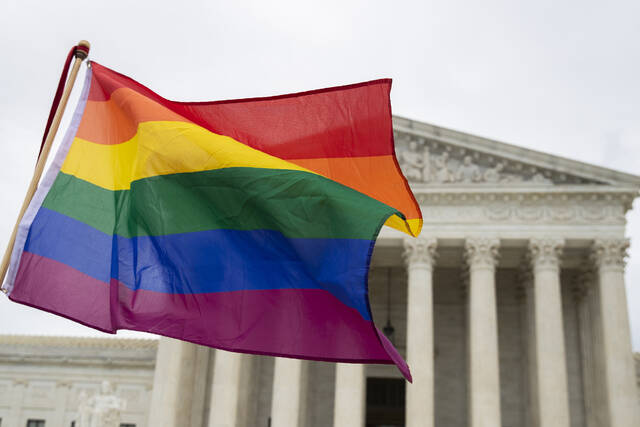When Roe v. Wade was overturned in 2022, local constitution experts told TribLive it signaled the U.S. Supreme Court’s willingness to roll back other privacy rights, including contraception, same-sex relationships and gay marriage.
Now, three years later, local constitutional law scholars say just four votes are needed for the justices to take up a case that could ultimately end the guarantee of same-sex marriage rights.
“It’s now 10 years that same-sex marriage has been a constitutional right and people have relied on that … carrying out their lives,” said Arthur Hellman, a University of Pittsburgh emeritus of law professor.
Who is Kim Davis?
The landmark decision, Obergefell v. Hodges, found that by both the Due Process Clause and the Equal Protection Clause of the 14th Amendment afforded same-sex couples the right to marriage in 2015.
Despite the court’s decision, Kim Davis, a Rowan County clerk, refused to issue any marriage licenses because she felt her Christian beliefs prevented her from complying with the Supreme Court decision.
The issue drew national attention because of videos of Davis arguing with a same-sex couple in the clerk’s office and refusing to issue them a license.
The American Civil Liberties Union, on behalf of four couples, then sued Davis, who continued to defy court orders and issue the licenses until a federal judge jailed her for five nights in September 2015. Davis was denied an appeal in 2020 and a federal judge has ordered Davis to pay a total of $360,000 in damages.
In March, she lost a bid to have her appeal of that ruling heard by a federal appeals court. She then turned to the Supreme Court.
Davis formally asked the court to review the extent in which a government employee can refuse to carry out job responsibilities based on religious objections in addition to overturning Obergefell v. Hodges.
An ‘unattractive standard bearer’
Hellman believes the court will avoid revisiting Obergefell v. Hodges because of the extent to which people have relied its precedent since 2015. He believes that because Davis was a government employee, who refused to listen to the Supreme Court’s initial ruling, the court does not want to encourage similar behavior by hearing her case.
“She took the law into her own hands, and the fact that the law might change later doesn’t change that,” he said. “She’s just a very unattractive standard bearer for getting the law back to what it was before Obergefell.”
If the Supreme Court takes the case, Shaakirrah Sanders, a constitutional law expert at Penn State Dickinson, believes the focus will be on whether Davis’ government job binds her to the Constitution.
“She was not a private actor at that time, she was a government actor, and I think that sort of makes the situation much more complicated,” Sanders said.
Bruce Ledewitz, a Duquesne University professor emeritus, said it is possible that the court could say a particular worker doesn’t have to do something that violates their religious convictions, as long as the office figures out an alternative way to issue the license.
How could it happen?
When Dobbs v. Jackson Women’s Health Organization overturned Roe, the Supreme Court decided that a woman’s right to an abortion was not rooted within the 14th Amendment. The same argument could be applied to same-sex marriage, Hellman said.
“The rationale of Dobbs, in my view, does at least call into question the decision in Obergefell, but that doesn’t mean that the court would be compelled to reach a parallel result … in a new case,” he said.
Alternatively, Ledewitz said the decision was strictly about abortion and impacted no other precedent, while Obergefell is premised on the right to marry.
“Obergefell, unlike other privacy decisions, is premised on a very well established right, the right to marry, and so nothing about what was said in Dobbs about abortion would apply,” he said.
While a 2022 survey from the Pew Research Center, found that about 61% of adults in the U.S. had a positive view of the impact of same-sex marriage being legal while 37% of adults had a negative view, Hellman and Sanders both said the possibility of the Supreme Court revisiting Obergefell under different circumstances is not entirely off the table.
If a state court were to decide the Constitution does not require states to recognize same-sex marriage using Dobbs’ logic then the Supreme Court would be required to take up the case, Hellman said.
“The Supreme Court is not going to allow a lower court to nullify one of its holdings,” he said.
The messenger
Regardless of whether the Supreme Court reconsiders Obergefell, many in the LGBTQ+ community say the very discussion makes them feel as though their value and worth as individuals are being questioned. While Pennsylvania is not among the states that prior to Obergefell had banned same-sex marriage, the discussion is troubling, said Sarah Rosso, executive director of Hugh Lane Wellness Foundation, an advocacy organization for the LGBTQ+ community.
“Regardless of the messenger there is a question of how people get to exist in society,” she said.
If the court overturned Obergefell v. Hodges, Hellman believes it would apply prospectively, leaving states free to block future same-sex marriages. However, he believes that the couples already married would remain so legally.
“I think it is important for people to remember that the U.S. Supreme Court in general, does not dictate rights under state constitutions,” Sanders said. “If there are state constitutional protections or state statutory protections for same sex marriage, then it is very likely that those will stand and remain.”








